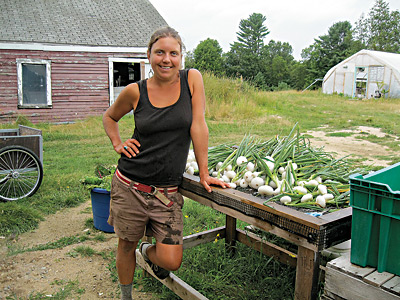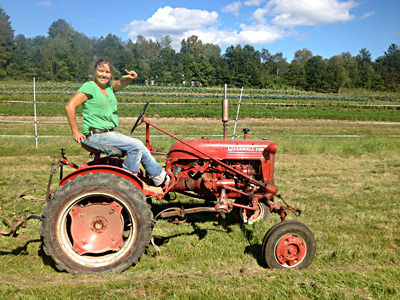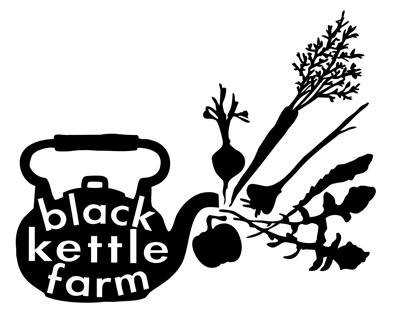 |
| Laura Neale with part of an onion harvest. Photo by Sue Neale. |
By Stowell Watters
Catillus – Latin for “kettle” meaning “a deep vessel.”
It is a tool that outshines its various permutations to remain stark and simple. A robust icon forged in black iron, it is a familiar sight, the agrarian symbol heating up in the heart of the house. And now it is the flag of a particularly fitting endeavor – a MOFGA certified organic farm in Southern Maine, Black Kettle Farm.
“The black kettle is all about abundance, keeping the home fires burning,” says owner Laura Neale. “It’s strong, it’s solid.”
From Manager to Farmer
In 2008 Neale took a job managing Wolf Pine Farm in Alfred. Home to the white-pillared county seat of York County and a historical Shaker village, the town of Alfred and much of the surrounding area was bought from the Abenaki Native Americans for “two large blankets, two gallons of rum, two pounds of powder, four pounds of musket balls, and 20 strings of beads,” according to Jim Brunelle, editor of the Maine Almanac.
After years of traveling, Neale, too, dreamed of her own great land acquisition, but, as many young farmers in Maine soon learn, a gung-ho attitude is not the only tool needed to find one’s own farm. Neale also needed a great amount of resilience.
“There were lots of ups and downs, lots of plot twists,” she says. “With the 2008 growing season winding down, I decided that I definitely wanted to stay in Maine, but that I definitely wanted my own gig.”
Wolf Pine is known in southern Maine for its extensive winter CSA program, but when Neale was there, the summer CSA was still cranking out shares for 200 members every week. She devoted her small amount of spare time to the quest for her own place.
Her first break came quickly, as the landlord of the old farmhouse where she was staying suggested she plow some of the old hayfield in the back. This was just down the street from Wolf Pine, and in the planning months of the winter of 2009, Black Kettle Farm was born.
 |
| Laura Neale spent a couple of years searching for a good farm site in Maine before settling in Lyman. Her MOFGA certified organic Black Kettle Farm now has 100 CSA members and counting … Photo by Abi Griffith. |
“Nothing was really panning out, I didn’t have a job for the upcoming season, it was winter, the hay field behind my house was the only option that was presenting itself, so … I took it!” she says.
The time there was extremely challenging for Neale as the land proved a frustrating mess of weeds, grass and a complete lack of infrastructure. Despite this, Neale’s resolve remained strong; not even a weed-choked field could sway her from farming in land she had grown to love. She stuck it out for two years but in 2010 she moved on, continuing the long search for a place to plant the Black Kettle Farm.
With help from Maine Farmland Trust, she tapped into The Three Rivers and Great Works Regional land trusts; she enlisted the help of realtors and friends; she took tips and went full-force into the search.
She drove around Maine with the state map sprawled on her lap, ogling potential plots. She left notes in mailboxes, glued herself to craigslist, talked to old farmers, and even got caught by a police officer while lying on her back in someone’s open field.
“I was just spacing out and dreaming about farming and generally just having a moment. It was all good; I explained myself.”
Throughout her search Neale considered leasing land or even purchasing a barren plot and building the structures she envisioned. After a few months she decided that she knew two things for sure: She wanted to farm and she wanted to do it in York County.
“It’s all rock walls and birch trees and maple, and I found a ton of old timers here that can just fix anything, and some real wild cards, too. It’s just good farming culture,” she says.
 |
After nearly two years of searching, she came upon an open spot in Lyman, less than 10 miles from Alfred – a plot she called the “last and final place [she] could find.” The parcel included 12 acres of land, 4 of which were gently sloping, arable and traced by a stone wall on the north side.
Lyman, like so many Maine towns, is both in the middle of nowhere and right in the thick of things. It lies in the foothills between the White Mountains of New Hampshire and the Atlantic Ocean and serves as a bedroom community for both Portland, Maine, and Portsmouth, New Hampshire. With Route 4 only two minutes from the farm, the possibilities for community and marketing seemed especially alluring to Neale. In addition to a good location and a manageable field size, the parcel came with an old farmhouse, a shed and the quintessential red Maine barn.
For Neale it seemed as if all the work had finally paid off – that her search was over. Except for one small catch.
“The field gets a lot of sun, so naturally the previous owners grew corn here,” she says. “Conventional corn.”
Learning about Organic
Throughout the formative years of her farming education, Neale had gravitated to organic agriculture. She spent her childhood in New York, went to Colby College in Waterville, then headed west. Her instincts led her to farming.
“I had no plans, post grad. I had studied anthropology, but the word ‘career’ never actually came out of my mouth. I mean, it was interesting, but I just wanted to get moving, get doing,” she says.
Neale worked on urban agriculture projects in San Francisco and apprenticed at the world famous French-intensive gardens at the University of California, Santa Cruz. She lived in Wyoming for a bit and spent time in Puerto Rico and Cuba. She participated in the World Wide Opportunities on Organic Farms (WWOOF) program in India, exposing herself to as many different lifestyles, cultures and peoples as possible. Through it all, farming emerged as the common thread.
“I just got into it. I guess I just loved the work, the skills, the tangibles – it was so radical to me; being outside, working, growing food,” she says.
Somewhere in this flurry of travel and farming, Neale started a small farm in Sonoma County. In the heart of California’s wine country, she and a few friends began planting and selling vegetables under the name “Sol Food.” The farm used organic methods and further solidified Neale’s growing hunch that organic was the way she wanted to grow, and the farming life was the life she wanted to lead.
But with time, her Northeast roots seemed to be aching from the transplant.
“I just felt like there was something going on back East that I wanted. So, I came back,” she says.
When she landed at Wolf Pine, the Black Kettle Farm was already growing in her mind, and when the plot in Lyman opened up, Neale knew it was time to go all in. The previous use of the land for conventional corn, however, weighed heavily in her mind, as she knew she wanted to become certified organic as soon as possible.
“It totally freaked me out. I mean, herbicides kill plants and I’m trying to grow plants,” she says.
Reclaiming the Land, Building the Farm
She signed the paperwork to buy the farm, got to work, and in the fall of 2010 hung an old kettle outside the barn. Black Kettle Farm had found its home.
“I thought to myself, ‘I own this place!’ I finally had a sense of permanence – and those things ended up being more important than I ever could have thought.”
She refers to her first task as “reclamation.”
“I wanted Black Kettle to be organic because I wanted it to be a safe place for food,” she says.
Guided by local farmers and MOFGA staff, Neale decided to take it slow and fallow the old corn fields. That spring she plowed as much of the land as she could, leaving the former corn land untouched. She also began the organic certification process, bought a couple of barn cats (including a particularly fine mouser named Pindy Wong), built a small hoophouse, and began to develop what she calls “the heart” of her farm: a CSA program.
“I’m pretty ‘Ra! Ra!’ about the CSA; it is everything to me. The camaraderie, the unity. I like to grow food people can use, real food, and then imagine them getting all creative with it in their kitchens,” she says.
Over the next few years she grew her farm slowly, adding a tractor here, a hoophouse there, a few new accounts and a few new customers. Her pace, she says, was slow but strong: “In retrospect, I am super glad that it took me a few years to ultimately find my current farm. I totally needed to reacquaint myself with the state, develop my business, slowly acquire equipment, get to know my community, and just practice farming more when the stakes were kind of low.”
Success
The outcome? Neale is now a MOFGA certified organic grower with 100 CSA members. She hopes to add more members in 2014, to grow the Black Kettle family even larger. (See https://blackkettlefarm.blogspot.com/ for information on joining her CSA). She sells her produce at the Portsmouth Farmers’ Market in New Hampshire, at a winter market in Rollinsford, New Hampshire, and to a handful of Portland and Portsmouth restaurants. She provides food to 40 seniors through Maine’s Senior FarmShare Program and takes her extra produce and seconds to a nearby York County food bank.
In 2013 she bought a small yurt to host apprentices and, in addition to vegetables, began to raise a few pigs on pasture. “The pigs are rad, and they ate better than I did sometimes, I swear!”
Neale’s farm is established but experimental, as she hopes to branch out into herb sales and tree-fruit production. She is satisfied but insatiable, always looking to the next thing, such as how to squeeze more out of her land by focusing deeply on soil fertility, or what to build next season and where to put it.
She overwinters succulents and beloved perennials in the upstairs of her house, and she plasters her packing shed with pictures of her smiling customers and workers, people she calls friends.
In Lyman she found a place to dig in, but in Black Kettle Farm she found a place to finally fit all that energy and all those people, cats and vegetables, all the hard days and the good days; all the creativity and the care. What’s more, she has built a place to carry on: “I just want to keep working outside all day, communicating with all kinds of things, the ebbs and flows of the universe. I think this farm chose me – I am in deep, man, and I love it.”
About the author: Stowell Watters is a MOFGA journeyperson at his farm in Limington.
